Reflecting on the FGC 101 Training at the Illinois Coalition Against Sexual Assault Conference
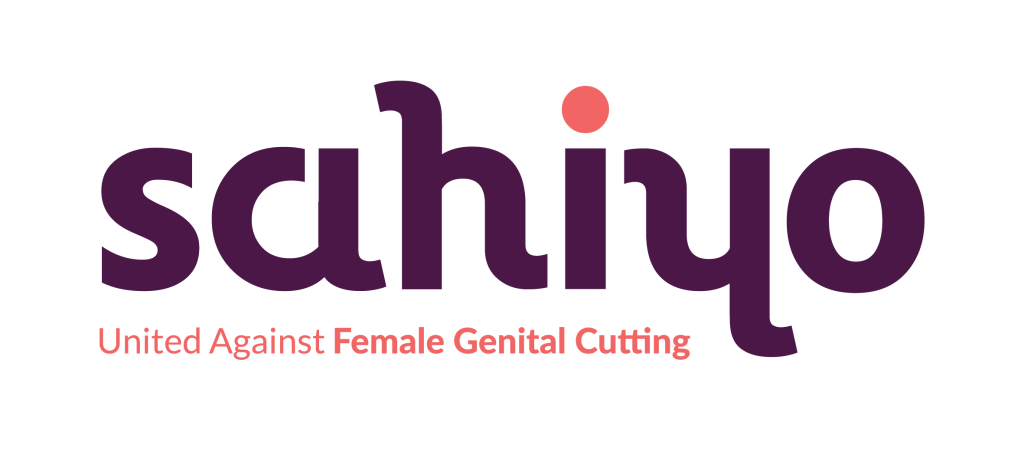
By: Jumai Olumo-Saidu Attending and presenting at the annual Illinois Coalition Against Sexual Assault (ICASA) conference in Springfield, Illinois, was a transformative experience. As a volunteer at Sahiyo and a second-year community psychology student at the National Louis University, I co-led an FGC 101 training session with Sahiyo’s Training and Technical Assistance Coordinator, Aries Nuno to educate advocates working in the sexual assault and gender-based violence field on the topic of female genital cutting (FGC). This blog reflects on my experience, interactions with the audience, and the impact our FGC 101 training at this conference had on my personal and professional growth. There were several moments during the FGC 101 presentation that stood out to me. The introduction to FGC, USA statistics, and the specific context of FGC, how it occurs, and who is impacted by it in Illinois all set the stage for a thought-provoking discussion. One memorable interaction was when a woman asked a question about balancing human rights with respecting cultural norms that have existed for generations. Her question highlighted the challenge of advocating against harmful practices without condemning entire cultures. This made me think deeply about approaching such sensitive topics without alienating the communities we aim to support. Another memorable moment was when a participant asked about alternative ways to empower survivors of FGC. This question shifted the focus from condemning the practice to finding constructive and supportive ways to help those who are affected by it. This moment in the presentation reminded me that our work should not only aim to end the harmful practice of FGC but also to uplift and empower survivors. The audience’s reaction to the stories of survivors was also a significant part of the presentation. The room was filled with shock and discomfort, but also curiosity. The emotional response underscored the importance of our work and the need for continued education and advocacy around this issue. The audience’s inquisitive questions highlighted the need for more awareness and understanding of FGC for the broader public, and even those working in fields related to FGC, such as human rights organizations, and those who work to fight against gender-based violence (GBV). Professional and Personal Growth This experience has had a profound impact on both my personal and professional life. Professionally, attending and participating in the conference reinforced the importance of cultural sensitivity and the need for a balanced approach when discussing FGC in my work. This experience also helped to emphasize the necessity of providing comprehensive resources and support for survivors. A prevalent myth is that FGC has health benefits, while in reality, it poses significant health risks, including chronic pain, infections, and complications in childbirth. The questions and comments from the audience offered valuable insights into such misconceptions and the gaps in knowledge about FGC that still exist today and need to be addressed. Therapeutic Aspects The conference was a therapeutic experience as well. Sharing the stories of survivors and discussing the nuances of FGC allowed me to process and reflect on the emotional weight of this work. It also reinforced my commitment to advocacy and education in this field. The supportive environment of the conference, combined with my colleagues and the audience’s shared passion, created a sense of community and solidarity that was comforting and empowering. It allowed me and the participants to voice the struggles and triumphs of advocating against FGC. The audience’s engagement and the meaningful dialogue that ensued affirmed the importance of our efforts and the positive impact we can and do have on the world. This experience reminded me why I chose this path and reinvigorated my dedication to making a difference in this space. Leading the FGC 101 training at the ICASA conference was a defining moment in my journey as a community psychology student and an advocate against FGC. The interactions and reactions from the audience were enlightening and underscored the critical need for continued education and advocacy on the practice. This experience not only contributed to my professional development but also provided a therapeutic outlet to process the emotional aspects of this work. As I move forward, I am more committed than ever to supporting survivors, educating others about FGC, and ensuring that cultural sensitivity and human rights remain at the forefront of our efforts to end this harmful practice. Related links: Sahiyo Presents FGC 101 Training at ICASA’s Annual Conference Paving the Path to End FGC in Washington State! Year 1 in Review FGC 101 Training for Volunteers at Asian Women’s Shelter
Sahiyo’s Second Annual Silent Auction & Comedy Show Reflection
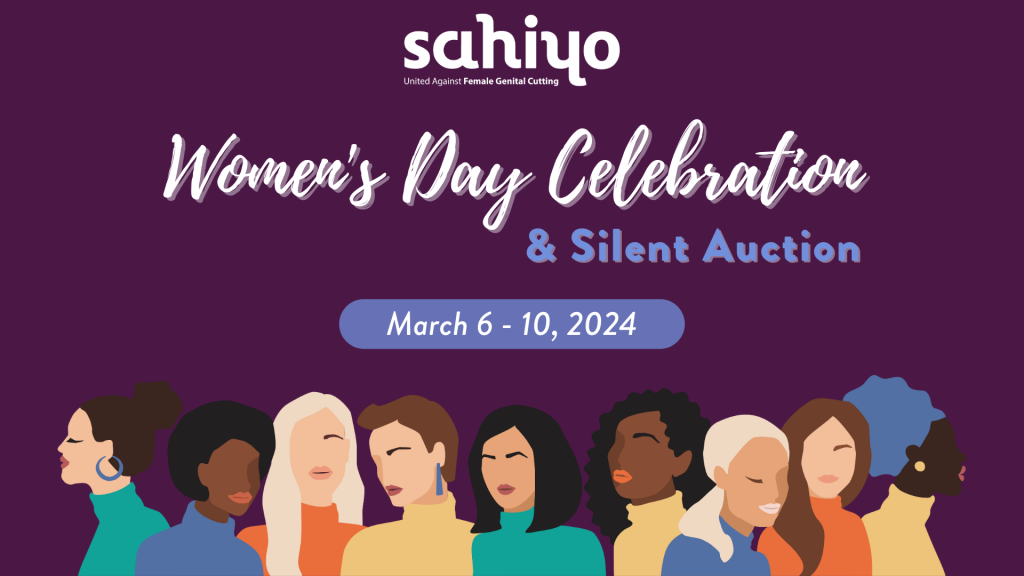
Thank you to everyone who participated in Sahiyo’s 2nd annual Women’s Day Celebration & Silent Auction! We are truly grateful for the show of support. With the help of our incredible donors and supporters, we raised over $13K. Our five-day celebration of women’s voices began on Wednesday, March 6, 2024, by opening our virtual auction stacked with some incredible donations from our supporters. Then we enjoyed a fun and interactive virtual live comedy show featuring incredible comedians, Zahra Noorbakhsh, Weyam Ghadbian, Pallavi Gunalan, and Mita Patel. Throughout the rest of the week, we highlighted talented women by sharing their gifts of inspiration, poetry, artwork, and much more on our social media platforms. We are especially appreciative of our sponsors who helped make this event possible: WeSpeakOut, Raziudin & Latifa Moosajee, and Tabassum Zalotrawala. Save the date for Sahiyo’s 3rd annual fundraising event which will be held March 5 – 9, 2025! Visit our website for more information or to sign up today.
Reflecting on Sahiyo’s Voices Healing Circle
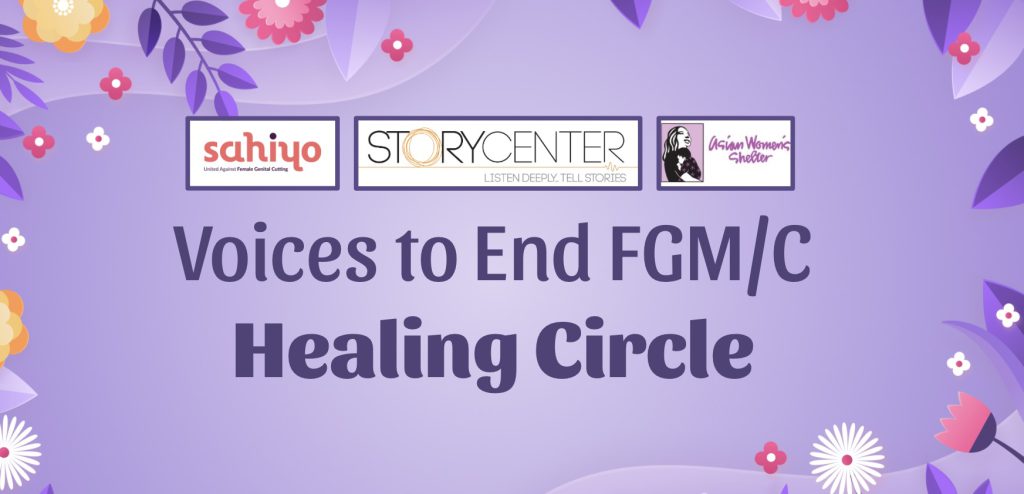
On December 18th, Sahiyo hosted a Voices Healing Circle where participants from across workshop cohorts came together to reconnect and meet new members of the Voices network. These sessions are part of Sahiyo’s ongoing support events for Voices alumni, serving to create a space for sharing experiences, fostering camaraderie, navigating the challenges, and celebrating the successes encountered post-release of their Voices to End FGM/C digital stories. This particular Healing Circle engaged Voices alumni who were open to sharing personal experiences from the release of their stories with the most recent Voices cohort. The Circle sparked discussions on the bravery in challenging barriers that make these conversations so difficult, as well as how opening up about female genital cutting (FGC) often means confronting not only personal trauma, but also societal expectations and norms. Alumni also reflected on experiences of receiving empathy from individuals not impacted by the practice, and how they were able to foster connections across diverse experiences. The overarching goal was to prepare participants of the August 2023 Voices cohort for the public debut of their narratives. Through open discussions, we can gain a deeper understanding of how to navigate the complexities and emotions that come with sharing personal experiences. We extend heartfelt gratitude to all participants of the Voices workshops over the years for their courage and resilience in sharing their stories with us and the world, and express our admiration for those taking steps towards breaking the silence and fostering understanding and change in their communities. Learn more about the Voices to End FGM/C program.
My time at the 2023 Peer-to-Peer National ARP Convening
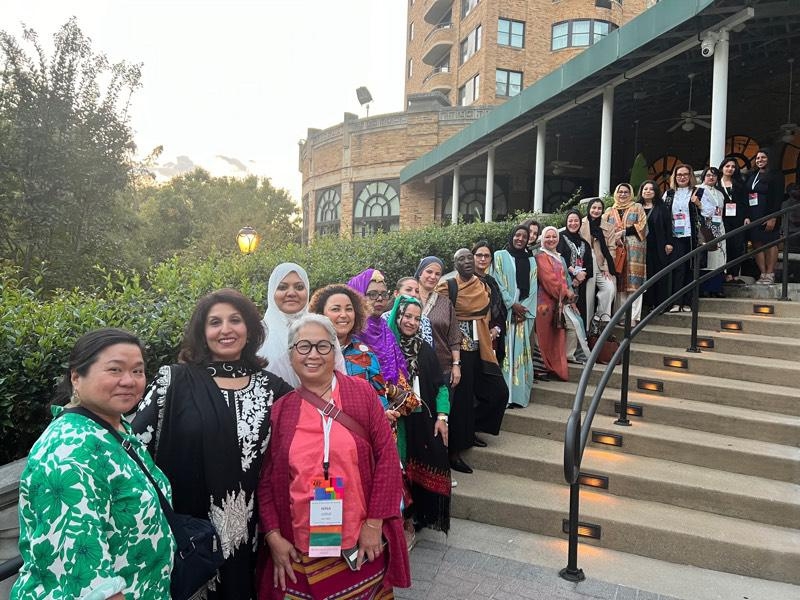
In October 2023, Sahiyo’s Community Engagement Coordinator Samman Masud as well as long-time Sahiyo volunteer and Activists Retreat planning committee member Umme Kulsoom Arif attended the 2023 Peer-to-Peer National American Rescue Plan (ARP) Convening in Washington D.C. The three-day convention welcomed representatives from over 40 non-profit organizations throughout the U.S. to join other grantees of the ARP Support for Survivors Program. Sahiyo U.S. was awarded as one of the subgrantees in April 2023 to build out its promising Activists Retreat program. A sub-grant under the 2021 American Rescue Plan Grant, the ARP Support for Survivors Program caters to culturally-specific, community-based projects for survivors of domestic violence and sexual assault from Asian and Pacific Islander (API) Communities in the U.S. and the Pacific. Leadership from various organizations led plenary sessions to address accomplishments and challenges involved in survivor-centered relief work for under-served and underrepresented communities of color impacted by gender-based violence. In addition to attending presentations and workshops, Sahiyo representatives received opportunities to network with other organizations through a variety of events including a cultural evening, an interactive Indian dance performance, a Paraguayan bottle dance, and a Native American closing ceremony to conclude the gathering. “The ARP convention was an eye-opening experience. I listened to speakers from the National Indigenous Women’s Resource Center, the Asian Pacific Institute on Gender-Based Violence, SCESA, and Ujima, among many others. I understood the impact of investment in organizations that seek to address the very unique needs of communities of color impacted by gender-based violence. Already vulnerable due to the intersecting systems of violence and power structures that continue to marginalize communities of color in the U.S., survivors often need culturally sensitive approaches to address domestic violence, sexual abuse, and female genital cutting (FGC). To hear the accomplishments and challenges of groups engaged in this work revealed the potential of grassroots level advocacy and community-led organizations. While there is a lot of work to be done in the gender-based violence space, the feminist solidarity I saw at the convention gave me immense hope about what this growing network can achieve: a future free from violence for all people.” -Samman Masud
Jo Keogh reflects on the 2023 Women Deliver Conference
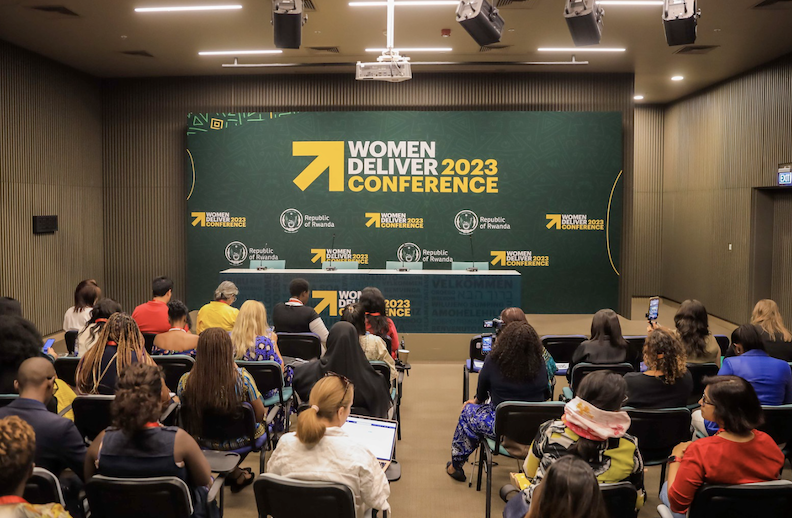
The Women Deliver 2023 Conference (WD 2023) took place in-person, as well as virtually, from 17-20 July 2023, in Kigali, Rwanda. The conference convened around 6,000 people in Kigali, and over 200,000 people online. Amongst those attending the conference was Jo Keogh, Sahiyo U.S. Advisory Board member as well as a founding member of the Connecticut Coalition to End FGM/C. She reflects on her experience in Kigali: Many things impressed me about Rwanda: the beauty of the land, the warmth and hospitality of the people, and, of course, the exciting experience of attending the Women Deliver Conference. Being in the presence of people committed to ending FGM/C from all over the globe was both moving and encouraging. Especially profound was hearing stories from frontline workers who have made ending this harmful practice their personal mission. Our own Mariya Taher is among them. I knew before traveling to the conference that Mariya is well-known here in the States for her tireless work around ending FGM/C. What I didn’t realize is that she is recognized and respected internationally for that work. Representatives from organizations fighting FGM/C all over the world knew who Mariya was. When I told people at the conference that I was with Sahiyo, their eyes would light up. It was remarkable to witness. I am so grateful to have had the opportunity to attend the Women Deliver conference and to understand the impact that Sahiyo has had the world over. The more I learn about Mariya, the more I admire who she is and all that she has accomplished. Learn more about the 2023 WD Conference.
Do I belong? Reflecting on the Activists Retreat
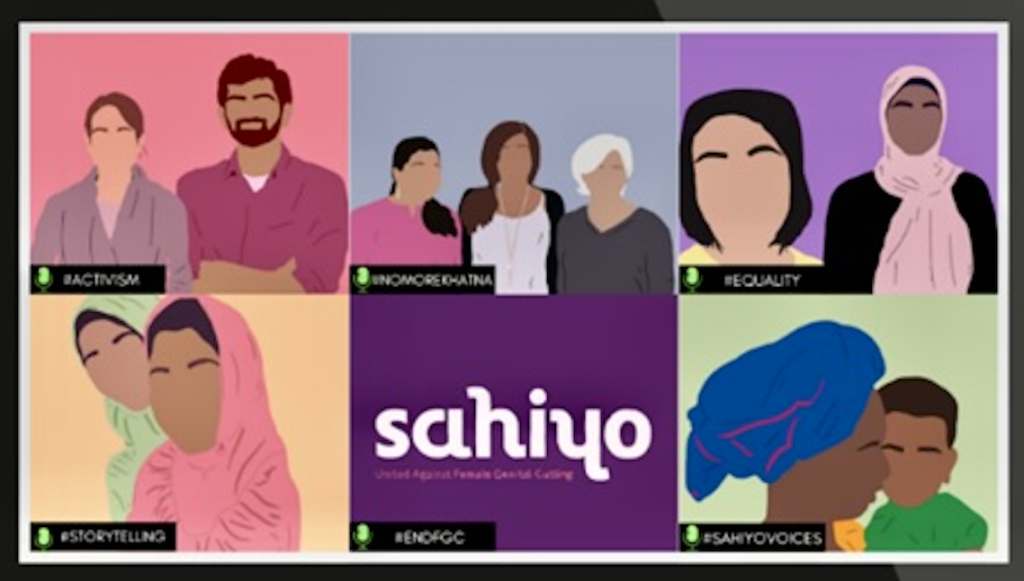
By Sakina Sharp Sahiyo’s annual Activists Retreat is a great way for both women and men connected to the Bohra community to discuss the issue of khatna, or female genital cutting (FGC). This is my third year attending the event, and I appreciate that this Retreat offers a safe space to have conversations about khatna. The first year I attended the event, I wondered if I belonged; I did not know if there was a space for someone like me who grew up Bohra, but does not currently fulfill all the requirements of the culture. I also wondered if there was a space for those Bohras who do “all the things,” and stand up against the practice of khatna. When I attended the Retreat, I realized that there was space for both. I found the Retreat to be cathartic, and it gave me an opportunity to process what had happened to me as a child. During this recent Retreat, the question of belonging came up again, but this time with a different flavor. Some participants wondered if they belonged because they had not personally undergone FGC. We all wonder if we belong, and the truth is, we all do. Men belong because we need their voices in the rooms where discussions on FGC are taking place. Women who have not undergone FGC belong because they can prevent future generations from holding on to this practice. Practicing Bohras belong because FGC is not a religious practice; we can be religious and still stand against khatna. Survivors belong because we know first hand the impact of khatna. All of our voices are important, and we all belong. Learn more about Sahiyo’s Activists Retreat here.
Reflecting on There’s an App For That?: Technological Innovation and Change Towards Ending Female Genital Cutting event
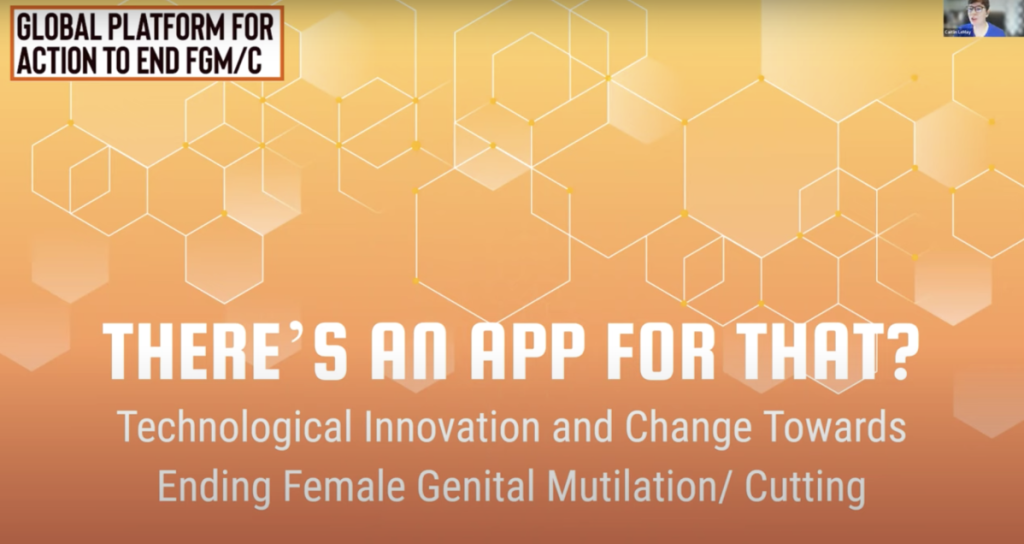
By Derrick Simiyu During this past March 8th, International Women’s Day, I was extremely excited to attend There’s an App For That? Technological Innovation and Change Towards Ending Female Genital Cutting, hosted by the Global Platform for Action to End FGM/C as a parallel event during the United Nations’ NGOCSW67. The webinar explored how technology, internet communication, and the digitalization of awareness raising can help support the elimination of female genital cutting (FGC). The event’s moderators were Caitlin LeMay of The U.S. End FGM/C Network and Esmael Omar of Amref Health Africa. Speakers for the webinar were leading innovators addressing FGC through technological solutions. The first was Priya Goswami, a Sahiyo Co-founder who has used her background in filmmaking and storytelling to create awareness about the harmful effects of FGC. She also created an app called Mumkin, the Bohra Gujarati word for ‘possible’. The aim of Mumkin was to provide a platform for engaging in difficult conversations around sensitive topics, such as FGC, domestic violence, and consent in relationships. Priya discussed how Mumkin creates a safe digital space where one can freely speak out without fear of coercement. While the app’s features are ethically improved through ongoing research, the safety of the app is of particular significance to the innovators. Mumkin is all about the difficult conversations needed to discover answers to ongoing challenges. The next speaker was Myriam Mhamedi, a lead communications and campaigns strategist for the End FGM EU Network. Myriam is in charge of implementing the Network’s awareness-raising and communication for advocacy initiatives. She discussed how End FGM EU was formed, which is an umbrella network of approximately 35 different organizations working to ensure a joint European action to end FGC. The presentation by Myriam Mhamedi stood out for me as she showed a network map of Europe that depicts the status of FGC in the different European countries. It is an awesome map that shows law, policy, data and training resources concerning FGC. According to the map, around 600,000 women are living with the consequences of FGC in Europe. It was surprising to me that FGC exists in Europe and has occurred in Europe for a long time; one may falsely think it is only done in Africa and does not happen in other places around the world. Another innovator was Purity Christine Achieng, a software developer in mobile application development. She co-directed the creation of the iCut app, which allows young women to seek medical and legal aid before or after forcibly undergoing FGC. i-Cut allows users to choose from five main options: help, rescue, report, information on FGC, and donate and feedback. iCut also provides a platform where victims can directly dial emergency numbers for FGC call centers and other pertinent helplines. Purity Christine explained how the app helps educate the general public about the harmful effects of FGC. She further stated that the use of technology to eliminate FGC is essential because it connects survivors quickly to organizations that can support them on their healing journey associated with FGC. I downloaded the iCut app, and quickly noticed the rescue centers, which I felt fulfilled the requirements of an FGC rescue app. The design was also amiable, in my opinion, making the experience enjoyable as well as informative. Julie Debois, a UNICEF child protection specialist, was the last speaker on the panel. She developed the Pasha app, which acts as both a responsive and a preventative tool that provides critical information about FGC. I found it very simple to download the Pasha app from the Google Play Store. I think the app is very user-friendly, and I appreciated the special function that allows users to report emergencies involving FGC anonymously if they happen to have no time for signing in. The innovators also spoke to the challenges they underwent in the process of launching and maintaining their technological tools. The panelist shared that even with these technological tools, there is a challenge via a lack of knowledge in FGC impacted communities that these technologies even exist. One key takeaway from the event for me was the need to incorporate and use technology in working to end FGC. It is a need that cannot be ignored. Through the use of technology, a bigger percentage of FGC impacted communities can be reached and we can move that much closer to ending FGC globally.
My thoughts on the Washington Senate Bill to end FGM/C

By FA When I was a teenager, my family discouraged me from speaking out against khatna, or female genital mutilation/cutting (FGM/C), for fear of repercussions from our community. I wanted to use my voice, but I did not want to disappoint my parents or bring shame to my family. As I followed the Detroit FGM case in 2018, I became increasingly disappointed as it all unraveled. Then I learned about Sahiyo and the amazing work they were doing to end FGM/C; I decided to use my voice to advocate for what I believe to be right. As a part of my advocacy, I am volunteering with the Washington Coalition to End FGM/C. While forty states already have anti FGM/C laws, Washington State does not currently have such a law. A 2016 study ranked the Seattle-Tacoma-Bellevue metro area as the fifth largest metro area in the U.S. in terms of the size of the FGM/C-affected community, which makes this lack of legislation especially concerning. State laws are critical in our journey to end this practice for a variety of reasons. For example, WA Senate Bill 5453, a bill heard on January 30th by the Senate Committee on Law & Justice , will create a private right of action for victims of FGM/C which will allow survivors to stand up for themselves in court when they are ready to do so. It prohibits providers from performing FGM/C on a minors, which helps curtail vacation cutting practices (sending the girl away on a “vacation” abroad with family for her to be cut). It establishes education and outreach initiatives to help teach families about the harms of FGM/C. Moreover, it provides care for victims by strengthening the mandatory reporting requirements to include FGM/C. By adding FGM/C to the mandatory reporting list, it will be legally required for certain fields to report the harm to the authorities (ie. child abuse reporting laws). These civil remedies give victims some of their power back, but it is not enough to deter others from committing this act in the future. In order to discourage community cutters from performing this act, there needs to be a strong deterrent in place. Based on my experiences, there is an enormous amount of cultural pressure to perform FGM/C. The penalties must be heavy enough to deter the cutter, and from what I have seen, monetary fees are not enough. For me, it is important that this bill includes an element of criminalization for those who perform the cutting, in addition to civil remedies. One of the aspects that I love about Sahiyo is the multi-faceted approach taken to end FGM/C. I am proud that the proposed bill reflects this approach and hope that you are able to support its passage.
Activists Retreat Reflection: What community means to me
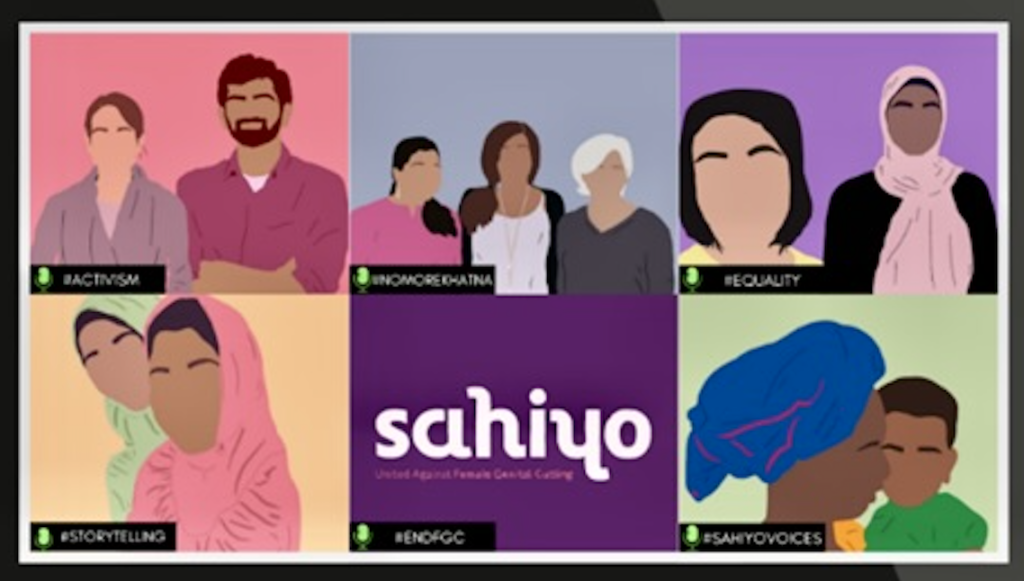
By Zehra Patwa My fifth experience at the Sahiyo Bohra Activists Retreat in June 2022 was, once again, eye opening, supportive, and so much fun; in particular, because I met a whole new set of North American Bohras I didn’t know before, as well as a couple of Bohras from Europe! This year, all participants (except for the planning committee) were first time attendees. It reminded me of my first time participating at the Activists Retreat, and how I felt such a part of the community during, and after. Community can mean so many things to so many different people. When we talk about the Bohra community, many feel remote from it. They may not agree with all the edicts that are sent down from Central Dawat, or they’re not fully paid up, card-carrying members of a jamaat. This is a shame, because there are so many different people who identify as Bohra or who have a connection to the Bohra community; in fact, I heard a number of attendees speak of “not being part of the Bohra community.” Thankfully this event brings these people together; here we all were at a Bohra Activists Retreat! Community is what we make of it and the anti-FGM/C Bohra Activists Retreat is, to me, an incredibly warm, supportive and fascinating community that I hope to be part of for a very long time. I so appreciate the support I get from the Retreat each year. It reminds me that we are not alone and that many people care about the work we activists do. Read the report on this year’s Activists Retreat.
Reflecting on A Quiet Violence: Navigating Female Genital Cutting as an LGBTQ+ Survivor

By Trisha Kini On June 23rd, Sahiyo hosted their webinar A Quiet Violence: Navigating Female Genital Cutting as an LGBTQ+ Survivor in honor of LGBTQ+ pride month. The event was moderated by Sahiyo U.S. Advisory Board chair, internal medicine physician, and chief medical editor of EverydayHealth.com Dr. Arefa Cassoobhoy. Panelists included poet, playwright, filmmaker, and producer Dena Igusti (they/them), End FGC Singapore volunteer Afiqa (she/they), lawyer, activist, and writer Umme Kulsoon Arif (she/they), and pelvic and gynecologic surgeon Dr. Marci Bowers (she/her). Oftentimes, LGBTQ+ and non-binary survivors of FGC are underrepresented and silenced in FGC activism, statistics, academic literature, and healthcare settings. Health organizations and anti-FGC advocacy movements frequently use gender binary terms when referring to FGC survivors, further propagating the harmful idea that FGC only impacts women. Panelists who identified as non-binary FGC survivors, Dena, Afiqa, and Umme, all shared stories of their own journey in understanding sexuality and gender as survivors of FGC, along with the harms of a false assumption that every survivor of FGC identifies as a woman. While it is true that FGC impacts those assigned female at birth, not all survivors identify with being a woman, womanhood, and heteronormative culture. Ascribing cisgender-heterosexual labels and expectations to non-binary survivors not only dismisses one’s identity and personhood, but also negatively impacts a survivor’s mental and physical health. Members of the panel advocated for the needs of unheard LGBTQ+ survivors, and raised awareness about steps anti-FGC organizations can take to be more inclusive, respectful, and welcoming to survivors of all gender identities. The event began with two powerful videos from our 2022 Voices to End FGM/C cohort, which were recently released to the public. Dena Igusti’s On being a Nonbinary Survivor of FGM/C highlighted that the use of non-inclusive language and terminology in FGC-related statistics has led them to question whether their experiences can be validated as a gender non-conforming individual. This was followed by Afiqa’s eye-opening video Conversations with my Mother, which shared their experience of learning about FGC as a young girl. Afiqa often questioned why circumcision was celebrated for men versus women, and as they continued to question FGC and heterosexual norms, they realized their reality of gender and sexuality did not match what society demanded of them. The lack of LGBTQ+ inclusive resources available in healthcare settings, therapy, and anti-FGC organizations has actively limited the amount of care non-binary FGC survivors can benefit from. Dena, Afiqa, and Umme often found they had to create their own language for themselves, as their experiences were not considered in the resources sought for their own healing. They also found that their experiences were often downplayed by society through invalidation and ignorance. Following this discussion, Dr. Bowers stressed the importance of gender affirming care, which refers to medical interventions that support an individual’s gender identity. With anti-FGC bills in Texas and Idaho that prohibit gender affirming care, healthcare as a right has been denied to trans individuals, which further deters LGBTQ+ individuals from seeking care. This has put LGBTQ+ youth at risk of facing wider health complications and neglect from the system. In addition, the reversal of Roe V. Wade has turned back the clock and denied rights to bodily autonomy. Trans people, just like cis people, deserve the right to safe spaces for healthcare, gender affirming care, and the right to choose what happens with their bodies. The webinar ended on an important note: how allies can be supportive of LGBTQ+ survivors. Some of the many steps we can take as allies are as easy as amplifying voices, even if it just means adding your pronouns to your social media, or making public statements showing solidarity, such as “trans rights are human rights.” In terms of anti-FGC initiatives, it is essential to actively make an effort to utilize gender inclusive language and include non-binary folks, rather than restricting FGC to a woman’s issue. This applies to medical care as well. Healthcare providers can actively stand with their LGBTQ+ patients by implementing inclusivity in intake forms, wearing pronoun buttons, unlearning assumptions, educating each other, and making an effort to meet the patient where they are, thereby cultivating an open-minded and respectful environment. One of the big takeaways I gathered from this webinar is the harmful impact of assuming one’s experience with gender-based violence (GBV). Not all LGBTQ+ survivors of GBV share similar experiences, as these are also shaped by intersectional factors such as culture, value, and religion, among others. In order to make an effort to understand one’s experience with survivorship, asking questions, showing support, and speaking up can make all the difference in helping LGBTQ+ survivors feel safe and welcomed. LGBTQ+ individuals, like cisgender, heterosexual ones, are well within their rights to expect respect, healthcare, and inclusion in order to facilitate their own healing and growth. Watch the webinar here. Read the transcript from the webinar here.
